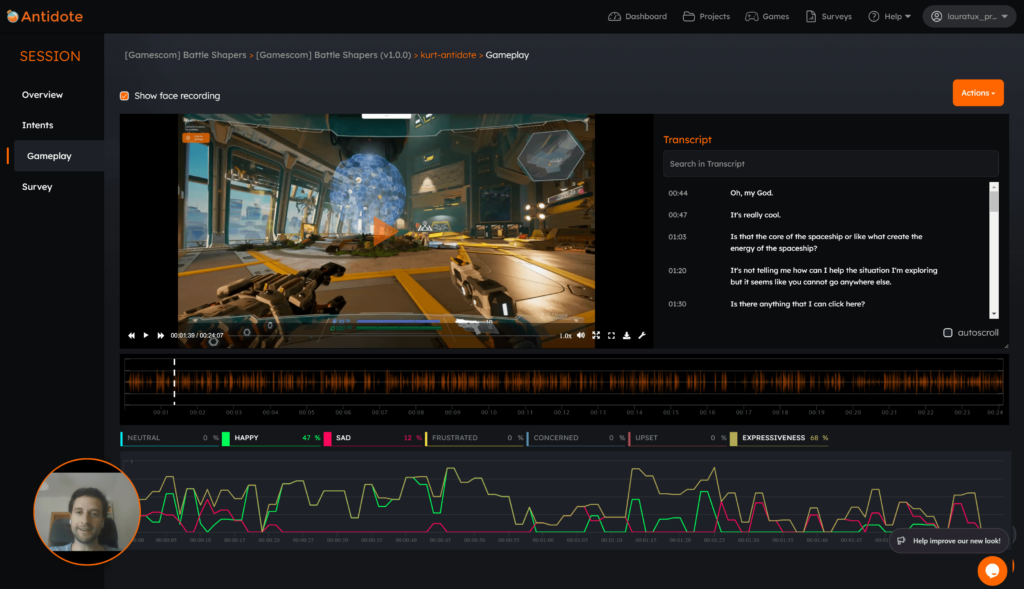I’ve seen this pattern too many times.
A studio runs a playtest, gets feedback from players and then… nothing changes. The same issues that players flagged show up in the next build and eventually, at launch.
It’s like asking for directions and then choosing to drive the other way.
After 10+ years in this space, I’ve learned that playtesting doesn’t improve your game, acting on the feedback does. Let me explain why studios struggle with this and what you can do about it.
Yes, Playtesting Is Important, But...

Asking your players for feedback is one of the smartest investments you can make when developing a game. It’s a direct line to your audience, the very people who will actually buy and play what you’re building.
Most of the studios we work with understand this. They run tests, analyze the insights we deliver, make meaningful changes and watch their games improve as a result. The feedback loop works exactly as it should.
For example, Ankama improved their new player retention by 25% after implementing changes based on the playtest insights.
But I’ve also worked with studios that collect mountains of data and then let it sit there. They go through the entire process of recruiting players, running sessions and reviewing results, only to ignore what they learned.
So in a way, it ends up being costly both in terms of invested resources and potential player churn.
Why Studios Don't Act on Feedback
Implementing feedback isn’t always straightforward. Here some reasons why studios hesitate to act on what they hear based on my experience:
1. It’s painful to change something you love.
Maybe that mechanic you love isn’t resonating with players. Maybe the feature you spent months building is confusing people more than helping them. Hearing that hurts, especially when you’ve invested so much time and energy into making it work.
You know the feedback is valid, but accepting it means letting go of something you believed in. That’s extremely difficult and I don’t want to minimize that.
2. It feels overwhelming and complicated.
Sometimes feedback comes in and you’re not sure where to start. Players are highlighting ten different issues and you don’t have the resources to fix everything at once. So instead of prioritizing and tackling what you can, it’s easier to do nothing and tell yourself you’ll address it later.
The reality is that acting on feedback doesn’t mean fixing everything immediately. It means being strategic about what matters most and making progress where you can.
3. It challenges your vision.
You had a specific idea for your game and player feedback is suggesting something different. It’s tempting to dismiss that feedback as players “not getting it” or not understanding your vision. But if your target players aren’t getting it during testing, they won’t get it at launch either.
Your vision matters, but so does making a game that actually works for the people playing it.
What You Can Do About It

If you’re finding it hard to act on feedback, here’s my advice based on what I’ve seen work for studios in your position.
1. Start Small with Quick Wins
You don’t need to tackle everything at once.
Pick one or two pieces of feedback that you can address relatively quickly and start there. Maybe it’s a confusing UI element or unclear tutorial text. These quick wins build momentum and prove to your team that acting on feedback doesn’t have to be overwhelming.
The goal here is progress.
2. Prioritize Based on Impact vs Effort
Not all feedback is created equal.
Some issues affect every player’s experience, while others impact a small subset. Some fixes take an hour, others take months.
Create a simple matrix:
- High impact and low effort? Do those first.
- High impact but high effort? Plan for those strategically.
- Low impact? Maybe these can wait and that’s okay.
You can’t fix everything, so focus on what will make the biggest difference for your players.
3. Set Clear Timelines for Implementation
Feedback that doesn’t have a timeline rarely gets implemented. After each playtest, decide when you’ll address the key issues. Maybe it’s the next sprint, maybe it’s after your current milestone, but put it on the roadmap.
Without deadlines, it’s too easy for feedback to get buried under other priorities.
4. Remember Why You’re Making This Game
Here’s the psychological part that often gets overlooked. Getting critical feedback can sting. It’s natural to feel defensive when players don’t love something you poured your heart into.
But step back and remember why you’re making this game in the first place. You want players to have a great time, to feel something, to enjoy what you’ve built. If feedback helps you get closer to that goal, it’s a gift.
Players who give honest feedback are trying to help you make your game better. They’re invested enough to tell you what’s not working. That’s valuable, even when it’s hard to hear.
What Happens Next
If you’re running playtests but not treating the feedback as important enough to act on, you have to ask yourself: why are you gathering it in the first place?
Feedback without action is just expensive data that goes nowhere.
The hard truth is that we can help you uncover problems and suggest solutions, but implementation? That’s on you and your team. Playtesting is just the first step. What you do with what you learn is what actually improves your game.
If you need help with playtesting, our platform makes it simple and secure to conduct remote studies.
You can get the insights you need to start improving your game 😊



